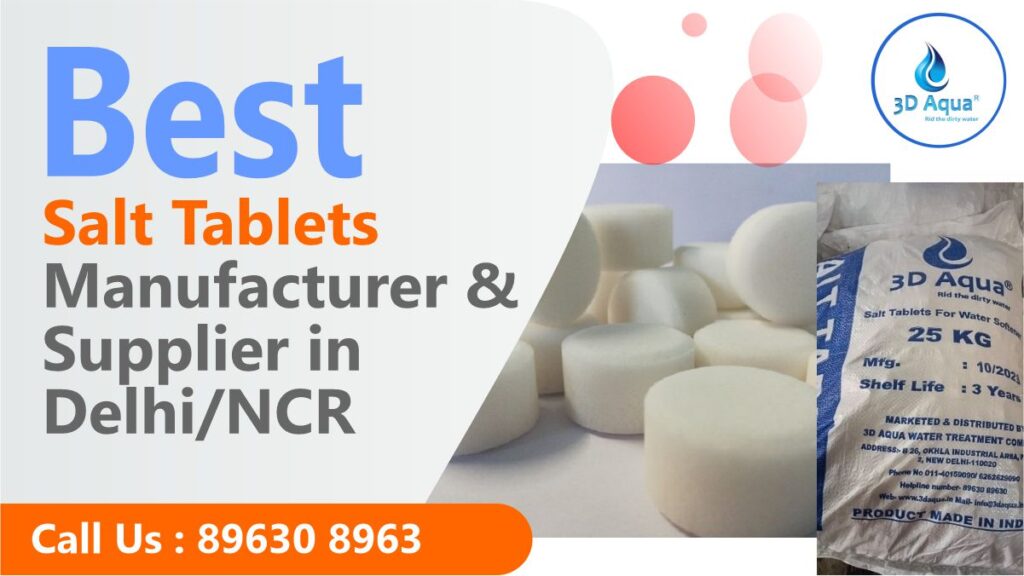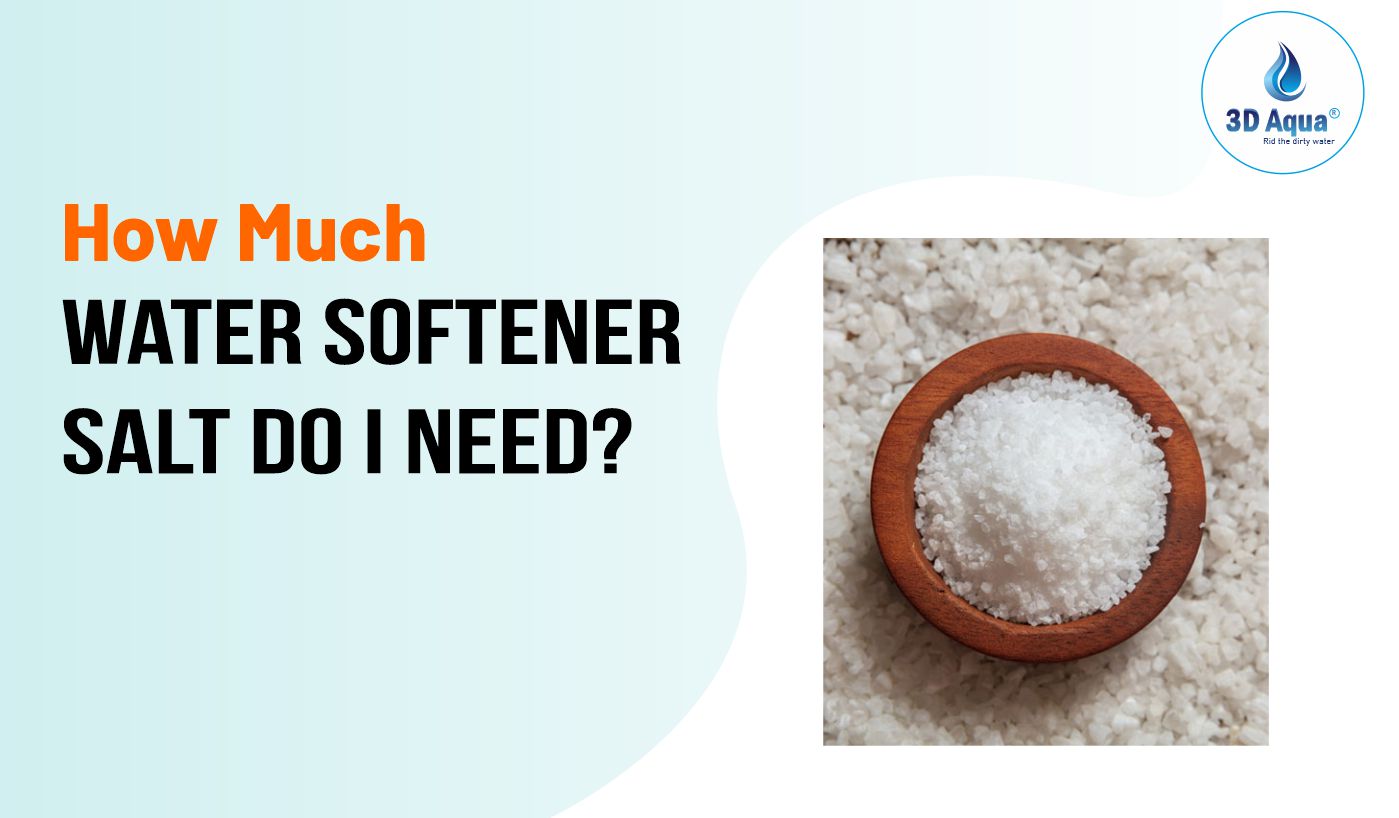Water softeners are essential for households plagued by hard water, which can cause various issues ranging from scale buildup in appliances to dry skin and hair. At the heart of these systems is the process of ion exchange, which often requires the use of salt. But how much water softener salt do you actually need?
This comprehensive guide will explore the factors that determine salt requirements, how to calculate your needs, and highlight 3D Aqua Water Treatment Company, a leader in the water treatment industry in India.
Understanding Water Softening and Salt

What is Water Softening?
Water softening is a process that removes hardness minerals, primarily calcium (Ca²⁺) and magnesium (Mg²⁺), from water. Hard water can lead to various problems, including:
- Scale buildup in pipes and appliances.
- Reduced effectiveness of soaps and detergents.
- Dry skin and hair.
The Role of Salt in Water Softeners
In a typical salt-based water softener, salt is used during the regeneration phase to recharge the resin beads that have absorbed hardness minerals. The salt solution creates a brine that replaces the calcium and magnesium ions with sodium ions, effectively “softening” the water.
Types of Water Softener Salt
- Rock Salt: A natural form of salt, often containing impurities. It is the least expensive option but not the most efficient.
- Solar Salt: Produced by evaporating seawater, solar salt is purer than rock salt and works effectively for softening.
- Pellet Salt: Highly refined and free of impurities, pellet salt is often considered the best choice for water softeners due to its efficiency and ease of use.
Factors Influencing Salt Requirements
1. Water Hardness Level
The hardness of your incoming water is a crucial factor in determining how much salt you’ll need. Water hardness is measured in grains per gallon (gpg) or parts per million (ppm).
- Soft Water: 0-60 ppm (0-3.5 gpg)
- Moderately Hard Water: 61-120 ppm (3.6-7 gpg)
- Hard Water: 121-180 ppm (7.1-10.5 gpg)
- Very Hard Water: Over 180 ppm (10.6 gpg)
The harder the water, the more salt will be needed for effective softening.
2. Daily Water Usage
Your household’s daily water usage significantly impacts the amount of salt required. For example, a larger family will use more water than a smaller household, thereby increasing the salt requirement.
- Average Family: A typical family of four uses about 60 to 80 gallons of water per day.
3. System Capacity
Water softeners are designed with specific capacities, often measured in grains. Knowing your system’s capacity is vital for understanding how much salt it will require for regeneration.
4. Regeneration Frequency
Water softeners regenerate after a certain volume of water has been treated. The frequency of this regeneration will impact salt usage.
- More Frequent Regeneration: Systems that regenerate frequently will consume more salt.
- Less Frequent Regeneration: Larger tanks may allow for longer intervals between regenerations.
5. Type of Salt Used
The type of salt you choose can also affect how much you need. Pellet salt tends to dissolve more efficiently than rock salt, leading to better performance and potentially less overall usage.
How to Calculate Your Salt Needs
Calculating the amount of water softener salt you need involves several straightforward steps:
Step 1: Determine Water Hardness
Start by testing your water to find its hardness level, which is crucial for the calculation.
Step 2: Estimate Daily Water Usage
Estimate your household’s daily water usage based on the number of occupants and their habits.
For example:
- Average Use: 80 gallons per day for a family of four.
Step 3: Calculate Total Grains of Hardness
Use the following formula to calculate the total grains of hardness:
Total Grains=Hardness Level (gpg)×Daily Water Usage (gallons)
For instance, if your water hardness is 10 gpg:
- Total Grains: 10 gpg × 80 gallons = 800 grains per day.
Step 4: Determine Regeneration Frequency
Most softeners regenerate once every 7 to 14 days, depending on water usage. For example, if you regenerate every 7 days:
Total Grains per Week=800 grains/day×7 days=5600 grains/week
Step 5: Calculate Salt Requirement
Most salt-based water softeners require about 0.5 to 1 pound of salt for every 1,000 grains of hardness removed. Using an average of 0.75 pounds for our example:

Step 6: Monthly Salt Requirement
To find the monthly requirement, multiply the weekly amount by 4:
Monthly Salt Requirement=4.2 pounds/week×4 weeks=16.8 pounds
Step 7: Adjust for Other Factors
If your family is growing or water usage is expected to increase, consider adding 10-20% to your total salt requirement.
Choosing the Right Water Softener Salt
When selecting salt for your water softener, consider the following:
1. Purity
Choose high-purity salt, such as pellet salt, to ensure optimal performance and longevity of your system.
2. Cost
While rock salt may be less expensive, it can lead to more frequent maintenance issues and may not dissolve as effectively as other types.
3. Availability
Ensure that the salt you choose is readily available in your area for consistent use.
4. Environmental Considerations
While water softening provides various benefits, the addition of sodium to wastewater may have environmental implications. Explore salt-free systems or alternatives if this is a concern.
The Role of 3D Aqua Water Treatment Company
When it comes to water treatment solutions, 3D Aqua Water Treatment Company is a premier choice in India. With over 25 years of experience, they offer a wide range of water treatment products, including high-quality water softeners and salt.
Why Choose 3D Aqua?
- Expertise: Their extensive experience ensures knowledgeable advice on selecting the right water treatment system for your needs.
- Comprehensive Solutions: From residential water softeners to commercial RO plants and sewage treatment plants, 3D Aqua offers various products tailored to meet diverse requirements.
- Nationwide Coverage: They serve clients across India, making their high-quality water treatment solutions accessible to all.
- Customer Support: Their dedicated team is committed to providing excellent customer service, from initial consultations to ongoing support.
For more information about their products and services, you can contact 3D Aqua at 89630 89630, email info@3daqua.in, or visit their website at 3DAqua.

Maintenance Tips for Water Softener Salt
1. Regular Salt Checks
Monitor salt levels in the brine tank and refill as necessary to ensure effective operation.
2. Periodic Maintenance
Schedule regular maintenance checks to keep the system running smoothly. This may include cleaning the resin tank and inspecting for leaks.
3. Water Testing
Occasionally retest your water quality to monitor hardness levels and make necessary adjustments to the system.
4. Avoid Contaminants
Ensure that no contaminants are introduced into the salt tank. This can affect performance and lifespan.
Environmental Considerations
When using water softeners, consider the environmental implications:
- Sodium Levels: Water softeners can increase sodium levels in wastewater, affecting soil and plant health. Explore alternatives if this is a concern.
- Salt-Free Options: Some systems use potassium chloride instead of sodium chloride, which can be a more environmentally friendly option.
- Recycling Salt: Investigate local recycling options for salt containers to minimize waste.
Conclusion
Understanding how much water softener salt you need is crucial for maintaining an effective water softening system. By evaluating factors such as water hardness, daily usage, system capacity, and regeneration frequency, you can accurately calculate your salt requirements.
Investing in a quality water softener and high-quality salt can significantly improve your household’s water quality, enhance appliance longevity, and provide various health benefits. 3D Aqua Water Treatment Company is your trusted partner in addressing water treatment needs in India. For more information and support, contact 3D Aqua at 89630 89630, email info@3daqua.in, or visit their website at 3DAqua. Experience the advantages of softened water and improve your quality of life today!

